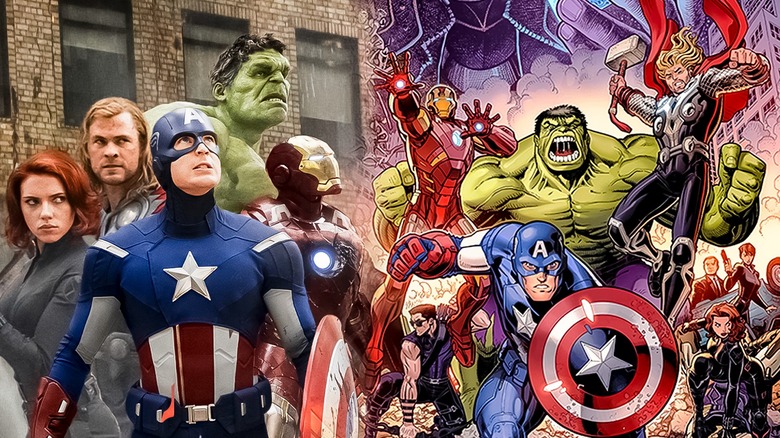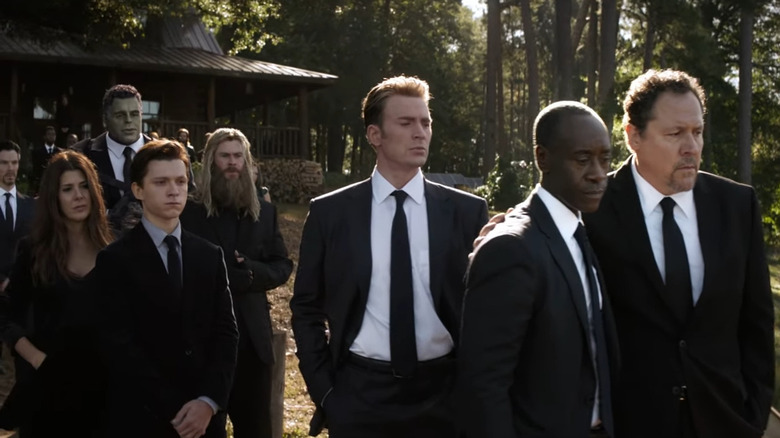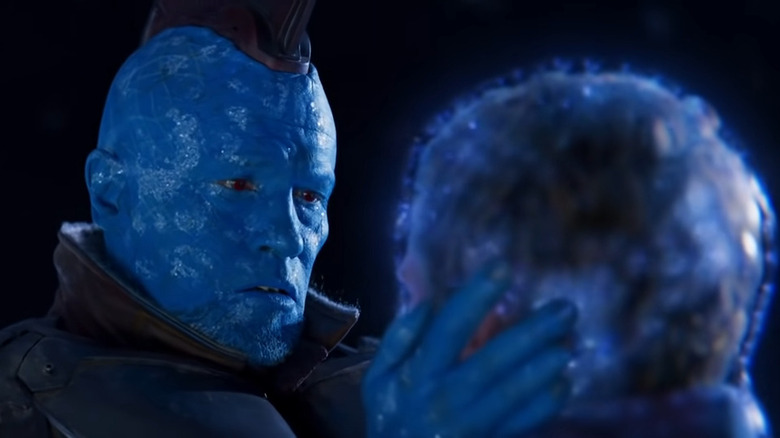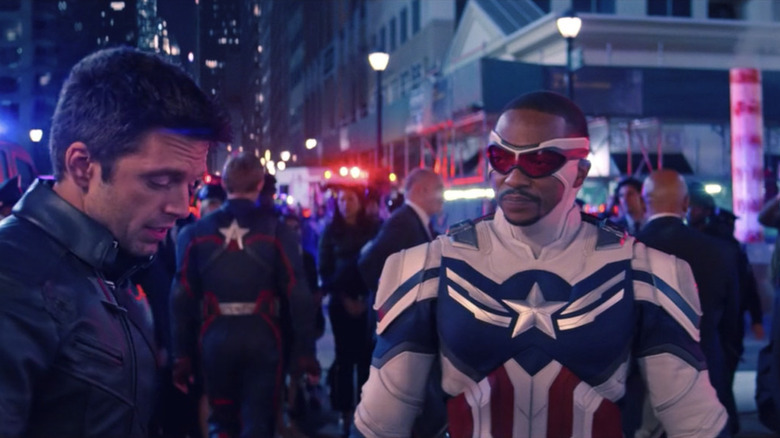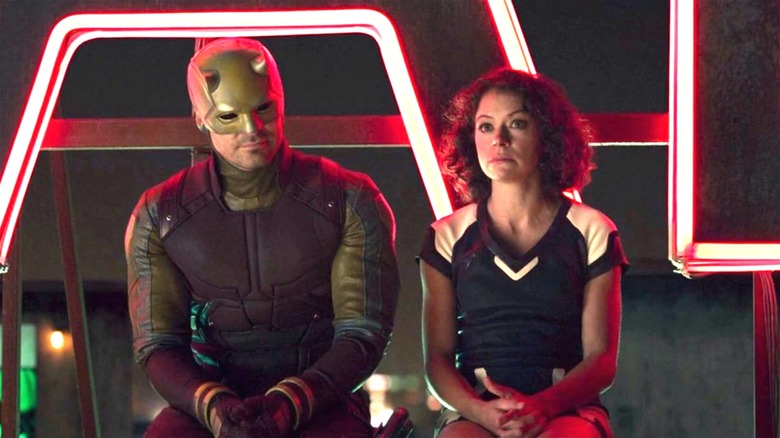The MCU Is Better Than The Comics For One Big Reason
Even after an incredible 15 years of entertainment, the likelihood of Marvel Studios slowing down is pretty unlikely. That franchise could do this all decade, let alone a day or two, given the material they have to work with. There are 84 years between now and the first ever Marvel comic released in 1939, and during that time, over 27,000 books were crammed with tales to astonish and amazing fantasies that Kevin Feige and Marvel Studios can simply pick off the shelf whenever they feel like it (competing ownership rights permitting).
Having such an enormous library to make selections from, though, also allows these live-action adaptations to avoid the pitfalls in which the source material has consistently found itself — that is, they can study the blueprint, see what works, and fix what doesn't. In comic books, fans have been forced to accept tired tropes, reboots, and character stagnation to an almost laughable degree,
Tropes and tired storylines have become recurring issues that comic book fans have been forced to accept over the years to an almost laughable degree. Thankfully, these problems haven't found their way onto the big screen, where change actually sticks, characters truly evolve, and death matters — to the point where now, like it or not, the MCU has surpassed its source material.
Marvel Studios lives and dies on its characters
Throw an Infinity Stone in any direction, and the likelihood of hitting a character with a solid story arc in the MCU is pretty high. From guilt-riddled playboy philanthropists to Norse god outcasts, numerous heroes and villains have gone on incredible journeys. The life-altering passage of time, mixed with love, pain, and traumas, has transformed all of the fan-favorites from the people we were initially introduced to. Granted, there have been some regrettable moments with some characters (Nat and Bruce's romance, Drax being pretty chill about avenging his family, and so on). Still, for the most part, significant events have signficantly changed the characters that they occur to, in a way that is satisfying for viewers and brings us closer to them. Essentially, when it comes to character arcs, every movie really does matter.
That's what sets the MCU apart from the comics — and for the better. Struggles, successes, progressions, and pains stick with its heroes, unlike the source material.
Face it, that's the problem with the comics, and we all know it: on the page, you're better off just picking a run you like and ignoring the ones you don't. In the comics, monumental, life-altering events do make for good story arcs, but the impact of these events are forgotten within months, or whenever editorial gets antsy and reboots the character back to status quo. As a result, comics feature great journeys, but these journeys don't truly matter — and rarely last. This is profoundly less interesting for readers, because these moments — good or bad — should stick, including when a hero dies in action.
Death is final in the Marvel Cinematic Universe
When it comes to Marvel Comics, not even death can put a stop to some of Earth's Mightiest characters. For example, extravagant shell-head Tony Stark has kicked the iron bucket a handful of times on paper, and returned soon after, like he'd forgotten his car keys rather than visiting the afterlife. A seldom few supporting characters have stayed buried (Peter Parker's Uncle Ben, Daredevil's Karen Page), but the top-level world savers rarely have flat-lined for long. As a result, fans tend to groan or complain when characters die, instead of getting teary-eyed.
The same can't be said for the inhabitants of the MCU. So far, excluding the snap back to reality (oh, that ol' Thanos) in "Avengers: Endgame," most of the characters that peaced out in the MCU have remained permanent exits. As they should. Adding a reset button to Tony, Natasha, T'Challa, Groot Senior, or Yondu would undo the dramatic impact and well-handled gut-punching loss for the characters around them. Furthermore, to bring them back would soften any future risk of danger, and perhaps more importantly, nullify some of the most intriguing elements of the MCU's future — the new heroes who are stepping in to take their place.
The MCU has heroes die so new heroes can rise in their place
With the perma-deaths of big players in the MCU sticking instead of being immediately retconned, the live-action universe has managed to adapt legacy characters in a more fulfilling way that avoids one snafu all-too-common in the comics — that is, too many heroes having the same mantle at the same time. In 2014, in the pages of the comics, Sam Wilson was promoted to the rank of Captain America and held on to the title for three years. After that, Steve Rogers returned to duty, clipping Wilson's wings and having him revert to being Falcon. Pretty unsatisfying, right? Only recently has Wilson donned the stars and stripes again, with both he and Steve carrying the title in separate books. But what's the point? Steve Rogers returning to pick up the shield almost nullifies Sam Wilson's ascension to the role, because it makes it seem like Rogers is the "true" Captain America.
That isn't the case for the MCU, and rightfully so. In the MCU, Sam Wilson is Captain America, the one and only, following the events of "Falcon and the Winter Soldier," and with the approval of the original shield-chucker himself. Because this new role for Sam is final, it heightens the stakes and renders his every action and character evolution that much more important. It's the perfect closing of one book, and opening of another. The same can be said for Shuri becoming the Black Panther or Yelena Belova being our new Black Widow.
Furthermore, keeping deaths final in the MCU helps this gargantuan shared universe fix a potential ailment that it's still at significant risk of suffering, if it isn't careful.
Death helps trim the herd for the MCU, and allows new characters to get their time in the sun
With the MCU quietly making plans for a fantastic future and a class full of mutants, their roster of superheroes is only getting bigger, veering ever closer to matching the proportion of its origins. Getting so big, though, puts the MCU at risk of becoming a franchise that the audience struggles to keep up with, the very thing that naysayers complained about during the time of the Infinity Saga, when it was still manageable.
However, it doesn't need to be that way. Permanent deaths, with satisfying endings, opens the field for previously left-out characters like She-Hulk and Daredevil, or Moon Knight and Shang-Chi, to make waves. Furthermore, having fewer characters to fill this world means focusing more on the ones that remain in it.
Given the MCU's top-heaviness in Phase 4 (with the amount of required homework getting ever larger), it's clear that the universe should never be afraid to make lasting changes, and keep focused on sharpening those character arcs. At this point, arguably, it's already a good time for the MCU to kill even more of its old-school cast, to get the narrative back to the standard it always delivered pre-Endgame. And this dedication to lasting impacts means that unlike the comics, where "reboot" is the norm, the MCU will never need to erase important stories, character developments, or events. Losses and the lessons learned have, and should, stick for future installments. Doing so gives a longer lifespan to the franchise at large, even if it shortens the lifespans of some of the fan-favorite characters within it.
